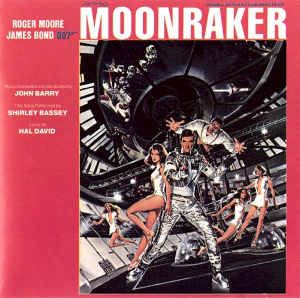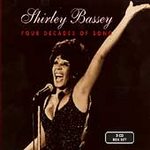
Dame Shirley Veronica Bassey is a Welsh singer. Best known for her career longevity, powerful voice and recording the theme songs to three James Bond films, Bassey is widely regarded as one of the most popular vocalists in Britain.

The Best of Bond... James Bond is the title of various compilation albums of music used in the James Bond films made by Eon Productions up to that time. The album was originally released in 1992 as The Best of James Bond, as a one-disc compilation and a two-disc 30th Anniversary Limited Edition compilation with songs that had, at that point, never been released to the public. The single disc compilation was later updated five times in 1999, 2002, 2008, 2012, and 2021. The 2008 version was augmented with the addition of a DVD featuring music videos and a documentary. Another two-disc edition, this time containing 50 tracks for the 50th anniversary of the franchise, was released in 2012.

John Barry Prendergast was an English composer and conductor of film music.
Since its inception in 1962, the James Bond film series from Eon Productions has featured many musical compositions, many of which are now considered classic pieces of British film music. The best known piece is the "James Bond Theme" composed by Monty Norman. Other instrumentals, such as "On Her Majesty's Secret Service", and various songs performed by British or American artists such as Shirley Bassey's "Goldfinger", Nancy Sinatra's "You Only Live Twice", Paul McCartney's "Live and Let Die", Carly Simon's "Nobody Does It Better", Sheena Easton's "For Your Eyes Only", Duran Duran's "A View to a Kill", Tina Turner's "GoldenEye" also become identified with the series.

Thunderball is the soundtrack album for the fourth James Bond film Thunderball.

Diamonds Are Forever is the soundtrack by John Barry for the seventh James Bond film of the same name.

"Goldfinger" is the title song from the 1964 James Bond film of the same name. Composed by John Barry and with lyrics by Leslie Bricusse and Anthony Newley, the song was performed by Shirley Bassey for the film's opening and closing title sequences, as well as the soundtrack album release. The single release of the song gave Bassey her only Billboard Hot 100 top forty hit, peaking in the Top 10 at No. 8 and No. 2 for four weeks on the Adult Contemporary chart, and in the United Kingdom the single reached No. 21.

Something is a 1970 album by Shirley Bassey. With her career having been in decline since the latter part of the mid 1960s, Something proved to be Shirley Bassey's comeback when it was released in August 1970. The title track single became her biggest UK hit for many years, reaching No.4 and spending 22 weeks on the chart. This was actually the second single featured on the album, "The Sea and Sand" having already been released earlier. The album was similarly her biggest hit for many years in the album charts, reaching No.5 and spending 28 weeks in the top 50.

Goldfinger is the soundtrack of the 1964 film of the same name, the third film in the James Bond film series, directed by Guy Hamilton. The album was composed by John Barry and distributed by EMI. Two versions were released initially, one in the United States and the United Kingdom, which varied in terms of length and which tracks were within the soundtrack. In 2003, Capitol-EMI records released a remastered version that contained all the tracks within the film.

Moonraker is the soundtrack for the eleventh James Bond film of the same name.

The Shirley Bassey Singles Album is a compilation album released in 1975 by British singer Shirley Bassey.

I Am What I Am was the only studio album recorded by Shirley Bassey for the Towerbell Records label. Several other tracks were also recorded at this label and issued as singles only. The recording sessions took place at Olympic Studios, Barnes, London, in July and August 1984. Following the success of the previous album All by Myself, this album peaked at number 25 in the UK album chart and reached Gold status. This release was the first digitally recorded album made by Shirley Bassey and was issued on vinyl, cassette and CD. Consisting of mainly re-recordings from Shirley Bassey's back catalogue and two new songs, this album was recorded 'live' with The London Symphony Orchestra, conducted by Carl Davies. The album also reunited Shirley Bassey with Norman Newell, who had served successfully as her producer throughout the 1960s.

Live in Japan is a double album by Shirley Bassey, recorded July 8, 1974 at Kosei-Nenkin Kaikan Hall in Tokyo, Japan. The album was released in Japan only, and the reverse of the cover listed the songs in English and Japanese. Live at Carnegie Hall had been released just a year prior, with nine of the same songs from Live in Japan, and it is believed that this is at least partly the reason Live in Japan didn't gain a worldwide release. Japan was an important growing market for many artists in the 1970s and many recorded live albums exclusively for release in Japan.

Four Decades of Song is a three-CD compilation from Shirley Bassey issued in 1996. This set features 54 songs recorded between 1959 and 1993. In 2008 EMI repackaged and retitled this boxset as Shirley Bassey The Collection; the new version had six extra tracks.

Bassey – The EMI/UA Years 1959–1979 is a 5-CD boxset compilation from Shirley Bassey issued in 1994, this set features 94 studio recordings on four CDs, recorded for EMI/United Artists between 1959 and 1979. Disc five features a previously unreleased live recording from Carnegie Hall. The boxset was reissued by EMI in 2010 in a standard jewel case set.

Sings the Movies is a studio album by Shirley Bassey, released in 1995.

"You Only Live Twice", performed by Nancy Sinatra, is the theme song to the 1967 James Bond film of the same name. The music was by veteran Bond film composer John Barry, with lyrics by Leslie Bricusse. The song is widely recognized for its striking opening bars, featuring a simple 2-bar theme in the high octaves of the violins and lush harmonies from French horns. It is considered by some to be among the best James Bond theme songs, and has become one of Nancy Sinatra's best known hits. Shortly after Barry's production, Sinatra's producer Lee Hazlewood released a more guitar-based single version.

The Shirley Bassey Collection is a double compilation album released in 1972 by British singer Shirley Bassey. The album charted at #37 in the UK charts in January 1972.
Eric Arthur Tomlinson was an English recording engineer, who recorded and mixed the scores to more than 120 movies.

25th Anniversary Album is a compilation album by Shirley Bassey. Released in 1978 to mark her 25th year in show business, the album was a double set, comprising 40 tracks. The songs included span just 20 of the 25 years from 1957 to 1976, however, her first professional contract is dated 1953. Bassey had toured extensively throughout 1978 to mark her 25 years. This collection, including her biggest hits and some lesser-known recordings, became one of her biggest in the UK, where it reached No.3 and spent 12 weeks on the album chart.



















